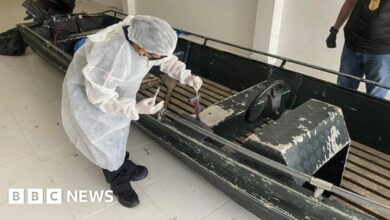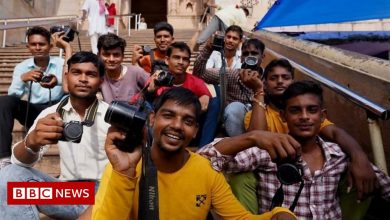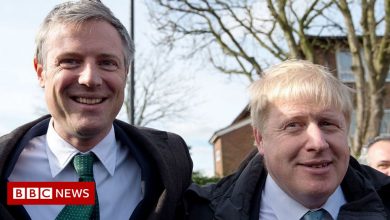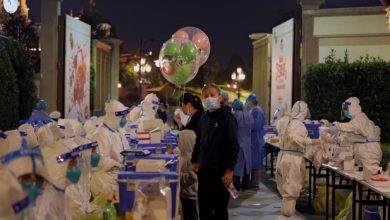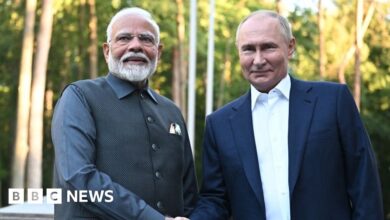Leader vows to win ‘at all costs’
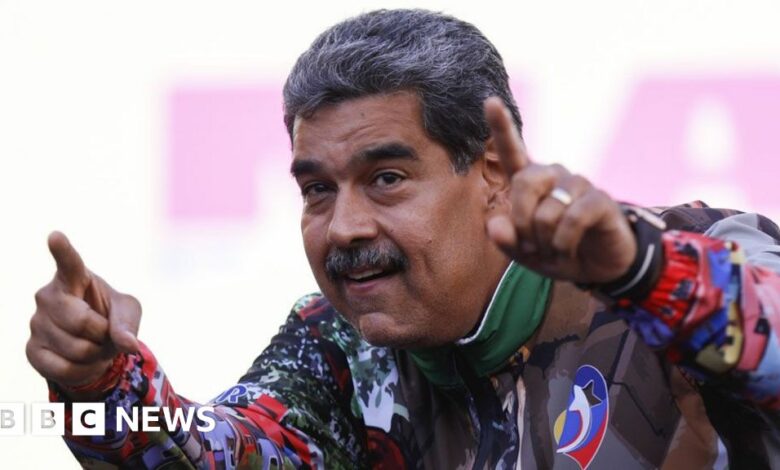
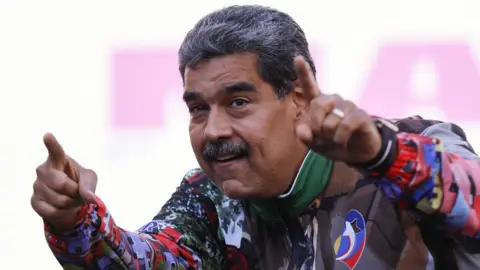 beautiful pictures
beautiful picturesWhen President Nicolás Maduro took the stage on February 4 this year to commemorate the anniversary of the failed coup led by his mentor, Hugo Chávez, his speech was always fiery.
February 4 is the day Chavismo, the political movement started by the late Chávez, celebrates its founding in 1992.
Addressing a loyal crowd of Chavistas wearing traditional red T-shirts, he urged them to show “nerves of steel” ahead of presidential elections in July this year.
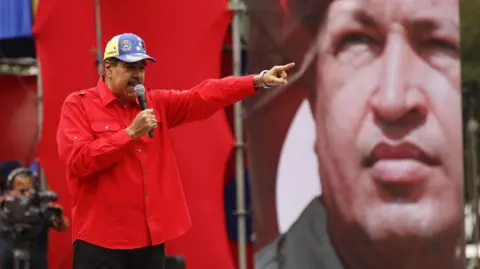 beautiful pictures
beautiful picturesHe had good reason to do so. Last October, 2.4 million Venezuelans voted in a primary election organized by a coalition of opposition parties.
The winner was María Corina Machado with 93% of the votes.
Ms Machado has since become Mr Maduro’s most formidable opponent, doing what many others before her failed to do – uniting Venezuela’s deeply divided opposition under one leader.
During his 11 years in power, Mr. Maduro has repeatedly confounded the opposition, in part because opposition leaders often spend more time attacking each other than focusing on defeating him.
And perhaps it was that anxiety that led Mr Maduro not only to predict victory in the upcoming election – something many other candidates have done – but also to add that he would win “at all costs”.
For opposition activists, who have long lamented being victims of government harassment, the president’s remarks came as no surprise.
But it was nonetheless a notable slip of the tongue from the leader of a movement that likes to see itself as representing the vast majority of Venezuelans, whose loyal support it says has brought it electoral victories and kept it in power without interruption since 1999.
This is not the first time Mr Maduro’s remarks have attracted attention.
Mr Maduro’s critics have long mocked his bluster and his humble origins as a bus driver.
But the 61-year-old has used his past to his advantage, cultivating an image as a “man of the people”, salsa dancing with his wife on long-running TV shows and never missing a chance to hit a baseball, shoot a basketball or spar with a boxer.
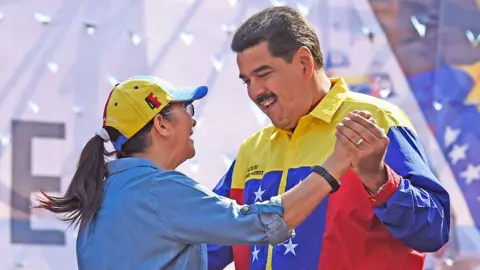 Getty
GettyAlthough he never achieved the same level of support among Chavistas as his predecessor Hugo Chávez, he remains the undisputed leader of the movement to this day.
This was not true when he was chosen as Hugo Chávez’s successor in 2012 after he was diagnosed with cancer.
Many thought Chávez would choose Diosdado Cabello, a hot-tempered and combative military man, as acting president while the ailing leader was receiving treatment in Cuba.
But instead, Chávez appointed Mr. Maduro, whom he had just appointed as vice president after six years as foreign minister under Chávez.
After Chávez’s death in March 2013, Mr. Maduro narrowly won the election that followed the president’s death, defeating opposition candidate Henrique Capriles by 1.6 percentage points—a result Mr. Capriles disputed.
In 2018, Mr Maduro won by a large margin in elections that were criticized as neither free nor fair.
The main opposition coalition decided to boycott the vote after a series of candidates were arrested or fled the country, leaving Mr Maduro’s chances of winning virtually empty.
Arguably, one of Mr Maduro’s main achievements is how he has managed over the past 11 years not only to prevent any challenge to his power within the PSUV but also to form a close alliance with his supporters.
His defense minister, Vladimir Padrino, has held the post for nearly a decade, ensuring that the armed forces always back him.
The support of the armed forces was pivotal when the leader of the opposition-controlled National Assembly, Juan Guaidó, declared himself the legitimate president in January 2019, arguing that Mr Maduro’s 2018 re-election was fraudulent.
Opposition hopes that Mr Guaidó would replace Mr Maduro in the presidential palace were soon dashed, with all major institutions remaining under tight government control.
Mr Maduro’s allies also control the main electoral body, the Supreme Court and the Attorney General’s Office, among other agencies.
Suspicious of outsiders, he assembled a group of trusted politicians and rotated them into various senior positions.
Among them is Delcy Rodríguez, who has served as communications minister, foreign minister and most recently vice president.
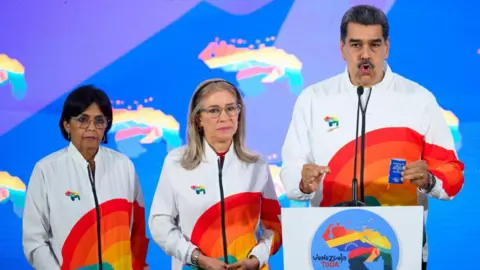 Getty
GettyHer brother, Jorge, also a close ally of Maduro, currently heads the government-controlled National Assembly.
Mr Maduro and some of his close associates – including his defence minister – have become more closely aligned after being indicted by US authorities in 2020 on charges of “narco-terrorism” and drug trafficking.
The president used the indictment to portray himself as a fighter against “US imperialist forces”, which he said were targeting him because he “stood up for the people”.
He also blamed US sanctions for the dire economic crisis Venezuela has suffered under his leadership.
Nearly eight million Venezuelans have fled the country over the past decade amid severe shortages and growing political repression.
To stem the economic downturn, in 2019 Mr Maduro eased some of the strict foreign currency regulations put in place by Chávez.
Shortages have eased since then, but those without access to foreign currency continue to struggle.
Polls show Mr Maduro’s popularity has plummeted in recent years, largely due to the economic downturn for which he is responsible.
However, his socialist PSUV party was still able to attract a loyal following, as well as a large number of people who benefited financially from his rule.
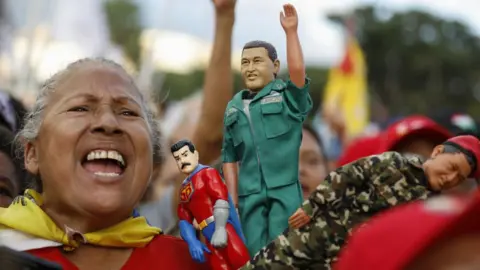 Getty
GettyHowever, his government’s actions in recent months appear to reflect his concern that his powerful party apparatus may not be able to win the election if the vote is free and fair.
First, the auditor general, a government ally, barred his main opponent, María Corina Machado, from running — a decision later upheld by the government-controlled Supreme Court.
The woman the opposition coalition chose to replace her in the vote was then prevented from registering.
Finally, a little-known former diplomat, Edmundo González, was confirmed as the opposition coalition’s unity candidate in April.
Mr González has overtaken Mr Maduro in opinion polls in record time, with some polls showing the 74-year-old leading the president by as much as 40 percentage points.
In response, Mr Maduro’s rhetoric has become more aggressive, even raising the risk of “civil war” if he loses.
“If you don’t want a bloodbath in Venezuela, a civil war caused by fascists, then strive for the greatest success, the greatest victory in the electoral history of our people,” he told voters less than two weeks before the election.
Calling for a bloodbath may seem extreme, but Mr Maduro has a lot to lose if he is defeated in the vote.
Not only is the US offering a $15m (£11.6m) reward for his capture on charges of “narco-terrorism”, but he is also being investigated by the International Criminal Court for alleged crimes against humanity committed by security forces during the crackdown on anti-government protests in 2017.
No one should be surprised if, faced with election defeat, the former bus driver refuses to accept that he has reached the end of his rope.
Many fear he will not go quietly.

